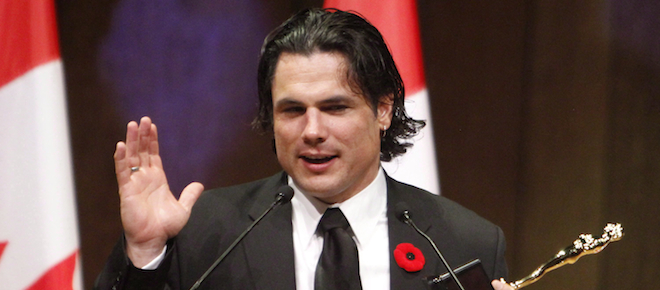Everybody writes about Brazeau
Tease the day: How quickly it all went downhill for the Senator from Maniwaki
Share

By now, you probably know all about a guy named Patrick Brazeau. You might have heard about him now and again over the past few years, for better or worse. He was the youngest Senator ever appointed. Before that, he was a vocal Aboriginal leader who headed the Congress of Aboriginal Peoples. He lost a celebrity boxing match to Justin Trudeau. He cussed out reporters on Twitter. He talked and talked and talked, and mostly, apart from the odd apology or retraction, got away with the things he said.
And then, yesterday morning, Brazeau was arrested in Gatineau, Que., across the Ottawa River from his office on Parliament Hill. An alleged incident of domestic violence had occurred. He was kicked out of the Conservative caucus within hours. If he’s charged and convicted, he might well be booted from the Senate by his fellow Senators. This morning, everybody chimes in about the complex, erratic, passionate, driven, and headline-prone Senator from Maniwaki. There’s little depth to the coverage, as most scribes simply recount,unpack and explain the odyssey that was Brazeau’s time in the spotlight.
What’s above the fold this morning?
The Globe and Mail leads with Senator Patrick Brazeau’s ejection from the Conservative caucus. The National Post fronts Brazeau’s arrest, following an alleged domestic violence incident. The Toronto Star goes above the fold with Brazeau’s crash. The Ottawa Citizen leads with Brazeau’s expected court appearance this morning. iPolitics fronts Brazeau. CBC.ca leads with the massive snowstorm sweeping across southern Ontario. National Newswatch showcases CBC News‘ take on Brazeau.
Stories that will be (mostly) missed
| 1. Spy watchdog. The federal government has made top-secret level security clearance mandatory for all appointees to the Security Intelligence Review Committee. | 2. Delisle. After the RCMP interviewed confessed spy Jeffrey Delisle a single time, no one from Canada’s intelligence community ever expressed interest in speaking with him. |
| 3. Military moves. As a way to cut costs, the Department of National Defence says it will forcibly move 10% fewer military families—a process paid for mostly by the feds. | 4. HRSDC data loss. NDP MP Ruth Ellen Brosseau was one of over 500,000 Canadians whose personal information was lost by Human Resources and Skills Development Canada. |